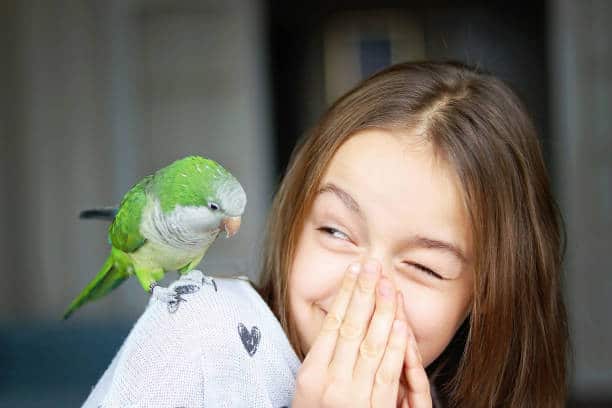The Winnebago County Animal Services adopts birds to be family pets. Under no circumstances should birds be used for food for other animals; for experimentation or laboratory work; or for any other use other than as a family pet. WCAS strictly enforces this policy under the terms of the adoption contract.
About Your Bird
A bird’s lifespan varies by species from 15 to 80 years. Parakeets and cockatiels have an average lifespan of 15 to 20 years.
Birds are social, inquisitive creatures. They bond to their caregivers and other frequent visitors, whistling and/or “talking” regularly. They enjoy human interaction and exploration of their environments.
Food and Basic Care
Birds need the following basic care:
- Fresh bird food and water daily. Pelletized foods are particularly important in terms of nutritional content, especially for those who do not have time to prepare fresh foods daily or for birds that will not eat a balanced diet. Food should be given in wide, shallow bowls rather than deep cups.
- Exercise. Birds should be allowed freedom from their cages, but should have their wings clipped regularly for their safety. A comfortable perch outside the cage also allows for interaction and exercise.
- Perches of appropriate size, height and materials.
- Toys and activities to stimulate the bird and keep it emotionally and mentally healthy. Select chewable items such as branches, pine cones, rawhide dog chews, natural fiber rope, or any toy safe for human babies. Be sure no parts of the toys are small enough to be swallowed. Rotating the toys periodically will keep a bird from getting bored.
- Quality veterinary care.
Environment and Care
Birds are intelligent and social pets that require love and attention. Although the amount of attention varies by species, a bird that is ignored or bored can go insane, pluck his feathers or even mutilate himself. Keep your bird in an area where there is family activity, but be sure he/she has a quiet area to sleep in at night. Talk to your bird during the day. If you work, leave a radio, CD or TV on when you are gone. Take your bird out for play and cuddling every day.
Birds need to live in steady temperatures. Sudden changes in temperature can be harmful. In excessively hot temperatures, birds may pant or hold their wings partially open; lightly misting the bird with water may help.
Birds of tropical origin may enjoy daily misting, but should be kept warm until their feathers have dried.
Birds should have supervised access to fresh air and direct sunlight; a bird should never be placed in direct sunlight without access to shade.
Cage and Equipment
A bird’s perch should be properly sized to allow the bird’s feet to sit comfortably. Be sure to use wood that has not been treated in any way. Perches should be located so that droppings do not contaminate food or water, so that the bird’s tail feathers do not touch the bottom of the cage and so that the bird does not have to bend over to avoid having its head rub the top of the cage.
Air pollutants can be especially dangerous to birds and may quickly kill them. Avoid allowing the following fumes in a bird’s environment: cigarette smoke, insecticides, fumes from overheated Teflon coatings (or similar coatings), mite sprays or boxes, and cedar, redwood, or pressure treated pine chips.
Cages should be lined with paper towels, newspaper or plain paper so droppings can be changed/monitored daily.
Health Care
Given the proper environment and nutrition, birds are generally very hardy pets. The best way to monitor a bird’s health is to know its healthy behavior. Any change in its regular behavior, feeding habits, or droppings might indicate a problem. Because a bird weighs only a few ounces, any loss of weight can be quite serious. If you notice anything different from your bird’s regular habits, you should see your veterinarian immediately.
Source: ARL – Animal Rescue League of Iowa, Inc. 2018 – https://www.arl-iowa.org/
